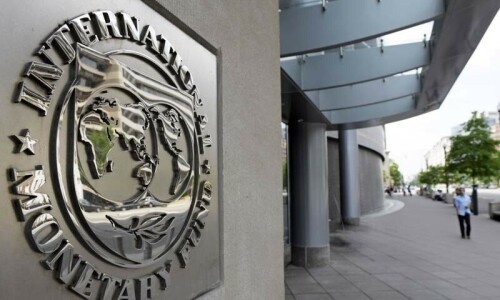BAGHDAD: When Saber al-Essawy looks out across the crumbling concrete tenements and cratered streets of Baghdad’s largest slum he envisions decades of neglect melting away, money flooding in and the gardens blooming.
“The Sadr City project will be a dream come true,” the mayor of Baghdad says with a twinkle in his eye, referring to an ambitious project to be launched next year. “Sadr City will be the best and wealthiest city in all of Iraq.”
Until last spring the sprawling slum was ruled by the Mahdi Army, a 60,000-strong militia loyal to Shia religious leader Moqtada al-Sadr that kept US and Iraqi forces out.
But the militia that once ruled Baghdad’s most ungovernable district melted away last spring in the face of an offensive launched by a newly emboldened Iraqi government, one determined to clean up its bloodied capital.
The Baghdad municipality plans to spend one billion dollars a year in Sadr City over the next decade in a bid to reverse the urban neglect that has eaten away at the district since it was first built in 1958.
At that time the wide boulevards and squat concrete housing of what was then called Revolution City were built to absorb migrants from the countryside, poor Shias from the southern marshes flocking to the city for work.
Residents initially welcomed the 2003 US-led invasion that toppled Saddam Hussein, but they soon embraced the anti-American Sadr, whose followers provided charity, services and some level of protection from insurgents.
Now Essawy hopes they will turn instead to the municipality, which has unveiled ambitious plans for rescuing the capital from the decay that has crept in during decades of war and sanctions.
He has projects to double the current supply of running water, construct a 40km metro criss-crossing the city and drastically expand and rejuvenate the city’s parks and gardens.
“We are trying to increase each person’s share of open space to 11 square metres, just like in the developed countries,” Essawy says.
He speaks in the staccato of a tireless technocrat, rattling off project parameters, price tags and pleas for foreign investment.
But beneath the scarred facades of Sadr City, many of them still burned and bullet-ridden from the spring offensive, his projects have their sceptics.
“What year is it, 2008? Let’s see if they succeed by 3008. I’ll give them a thousand years,” says Abu Haidar, a Sadr City merchant.
“It would be better if they gave that money to these people to go back to where they came from and build houses there.”
Sadr declared a ceasefire at the height of the fighting in May and his movement has since focused its efforts on social work and political advocacy.
But his face still stares down from posters plastered across the neighbourhood’s walls, and many residents still trust him and his followers more than the central government.
“These days we have gas, fuel, and electricity, but it is only because we are getting close to the elections,” says Abu Ammar, 48, a carpenter, referring to provincial polls slated for January, which the Sadrists are boycotting.
Jalil al-Sarkhi, a senior Sadrist official in the district, said he feared the mayor’s project would bring high-rise towers with tiny apartments that would sever extended families that each now live – snugly – under one roof.
“The people don’t need apartments, they need services, infrastructure,” he says. “This is not even discussed in some countries. Only in Iraq. Can you imagine discussing the question of water or electricity in France or New York?”
Distrust of the central government has run deep in Sadr City since the army stormed the neighbourhood earlier this year and left a labyrinth of walls, checkpoints, and roadblocks in its wake.
Sarkhi says the assault never really ended. “The city we are living in is still under siege ... The arrests continue, the raids continue.”
At the height of Iraq’s sectarian fighting in 2006, the Army Canal – a fetid bog 25km long filled with reeds and garbage – was the front line between Sadr City and Adhamiyah, with mortar rounds lobbed across its banks and bodies dumped in the shallows.
But here too Essawy sees an opportunity – he has secured $50 million for a project aimed at restoring the canal and building a Venice-like boardwalk along its banks, complete with parks, restaurants, and cafes.
On Dec 1 Essawy hosted local officials and tribal sheikhs at the official ground-breaking of the project, which was held inside a heavily guarded US base on the edge of the canal.
One of those who attended was US Lt-Col Steve Stover, a public affairs officer who had escorted reporters into Sadr City during the fighting.
“Rubble, burned-out cars, bullet holes, pock-marks. It was a full-blown battle zone,” he said. “I couldn’t equate Sadr City to anything else that I’ve ever seen. Right now, life can only get better.”
The ceremony was held on a freshly laid patch of grass, with flower beds, fluttering Iraqi flags, a US military brass band, and a view between blast walls of the towering reeds that clog the canal.
A few minutes before it began a car bomb went off just up the road, killing more than a dozen people and sending a wisp of white smoke rising in the clear blue sky – a grim sign that Sadr City may still be many years from normal.—AFP









































Dear visitor, the comments section is undergoing an overhaul and will return soon.